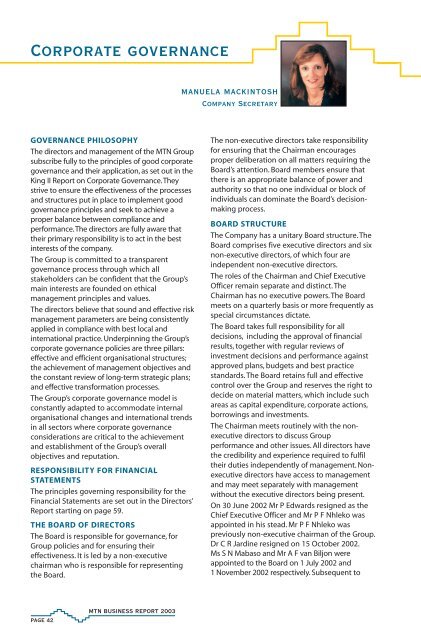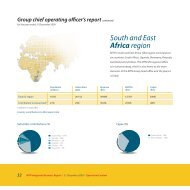(formely M-Cell Limited) - Business Report 2003 - MTN Group
(formely M-Cell Limited) - Business Report 2003 - MTN Group
(formely M-Cell Limited) - Business Report 2003 - MTN Group
Create successful ePaper yourself
Turn your PDF publications into a flip-book with our unique Google optimized e-Paper software.
Corporate governance<br />
MANUELA MACKINTOSH<br />
Company Secretary<br />
GOVERNANCE PHILOSOPHY<br />
The directors and management of the <strong>MTN</strong> <strong>Group</strong><br />
subscribe fully to the principles of good corporate<br />
governance and their application, as set out in the<br />
King II <strong>Report</strong> on Corporate Governance.They<br />
strive to ensure the effectiveness of the processes<br />
and structures put in place to implement good<br />
governance principles and seek to achieve a<br />
proper balance between compliance and<br />
performance.The directors are fully aware that<br />
their primary responsibility is to act in the best<br />
interests of the company.<br />
The <strong>Group</strong> is committed to a transparent<br />
governance process through which all<br />
stakeholders can be confident that the <strong>Group</strong>’s<br />
main interests are founded on ethical<br />
management principles and values.<br />
The directors believe that sound and effective risk<br />
management parameters are being consistently<br />
applied in compliance with best local and<br />
international practice. Underpinning the <strong>Group</strong>’s<br />
corporate governance policies are three pillars:<br />
effective and efficient organisational structures;<br />
the achievement of management objectives and<br />
the constant review of long-term strategic plans;<br />
and effective transformation processes.<br />
The <strong>Group</strong>’s corporate governance model is<br />
constantly adapted to accommodate internal<br />
organisational changes and international trends<br />
in all sectors where corporate governance<br />
considerations are critical to the achievement<br />
and establishment of the <strong>Group</strong>’s overall<br />
objectives and reputation.<br />
RESPONSIBILITY FOR FINANCIAL<br />
STATEMENTS<br />
The principles governing responsibility for the<br />
Financial Statements are set out in the Directors’<br />
<strong>Report</strong> starting on page 59.<br />
THE BOARD OF DIRECTORS<br />
The Board is responsible for governance, for<br />
<strong>Group</strong> policies and for ensuring their<br />
effectiveness. It is led by a non-executive<br />
chairman who is responsible for representing<br />
the Board.<br />
The non-executive directors take responsibility<br />
for ensuring that the Chairman encourages<br />
proper deliberation on all matters requiring the<br />
Board’s attention. Board members ensure that<br />
there is an appropriate balance of power and<br />
authority so that no one individual or block of<br />
individuals can dominate the Board’s decisionmaking<br />
process.<br />
BOARD STRUCTURE<br />
The Company has a unitary Board structure. The<br />
Board comprises five executive directors and six<br />
non-executive directors, of which four are<br />
independent non-executive directors.<br />
The roles of the Chairman and Chief Executive<br />
Officer remain separate and distinct. The<br />
Chairman has no executive powers. The Board<br />
meets on a quarterly basis or more frequently as<br />
special circumstances dictate.<br />
The Board takes full responsibility for all<br />
decisions, including the approval of financial<br />
results, together with regular reviews of<br />
investment decisions and performance against<br />
approved plans, budgets and best practice<br />
standards. The Board retains full and effective<br />
control over the <strong>Group</strong> and reserves the right to<br />
decide on material matters, which include such<br />
areas as capital expenditure, corporate actions,<br />
borrowings and investments.<br />
The Chairman meets routinely with the nonexecutive<br />
directors to discuss <strong>Group</strong><br />
performance and other issues. All directors have<br />
the credibility and experience required to fulfil<br />
their duties independently of management. Nonexecutive<br />
directors have access to management<br />
and may meet separately with management<br />
without the executive directors being present.<br />
On 30 June 2002 Mr P Edwards resigned as the<br />
Chief Executive Officer and Mr P F Nhleko was<br />
appointed in his stead. Mr P F Nhleko was<br />
previously non-executive chairman of the <strong>Group</strong>.<br />
Dr C R Jardine resigned on 15 October 2002.<br />
Ms S N Mabaso and Mr A F van Biljon were<br />
appointed to the Board on 1 July 2002 and<br />
1 November 2002 respectively. Subsequent to<br />
PAGE 42<br />
<strong>MTN</strong> BUSINESS REPORT <strong>2003</strong>
















